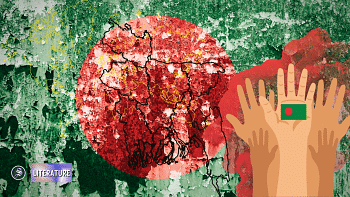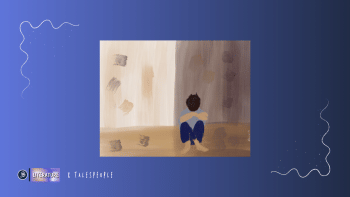Star Literature
Fiction / The Precious O
That split second when the rubber slaps your skin and stays, when there is a click of a switch, a levitation, a lightness of your body—everyone remembers the first time they are knocked out, everyone except Mr Suleyman Khar, regional light-heavyweight titleist,
Talespeople Spiels / A house a bit bigger on the inside
Playing with a location that seems real but is not is a tricky line to negotiate, and writer beware: you will be attacked
FICTION / The chasm
At around 2 AM he was awoken by the sound of Shahidun’s sniveling cries on her prayer mat. As grating as it might have sounded, he felt grateful for it to have woken him up.
'Cube': Sehri Tales selections, Day 30
The top selections in poetry, flash fiction and artwork for Day 30 of the Sehri Tales challenge; prompt: Cube.
'Call': Sehri Tales selections, Day 29
The top selections in poetry, flash fiction and artwork for Day 29 of the Sehri Tales challenge; prompt: Call
'Urge': Sehri Tales selections, Day 28
The top selections in poetry, flash fiction and artwork for Day 28 of the Sehri Tales challenge; prompt: Urge
'Liberation': Sehri Tales selections, Day 27
The top selections in poetry, flash fiction and artwork for Day 27 of the Sehri Tales challenge; prompt: Liberation
REFLECTIONS / Of Ramzans past
Thirty-odd years later, in my two-member home, I try to recreate the Ramzan vibes with overpriced and undersized lamps and lanterns sporting star and crescent motifs
At home
This is the first time I let you in, but you’ve already made yourself at home. You are bumbling around in my kitchen, as though you have been making me tea for a lifetime.
'Together': Sehri Tales selections, Day 17
The top selections in poetry, flash fiction and artwork for Day 17 of the Sehri Tales challenge; prompt: Together
'Library': Sehri Tales selections, Day 15
The top selections in poetry, flash fiction and artwork for Day 15 of the Sehri Tales challenge; prompt: Library
Byting wisely: The varying narratives of nationalism and independence
So in the spirit of Independence, I urge my reader to exercise independence of consumption—to question what you are buying, what you are reading, what you are watching, and which of these you are really given the freedom to choose.
'Double': Sehri Tales selections, Day 14
The top selections in poetry, flash fiction and artwork for Day 14 of the Sehri Tales challenge; prompt: Double
'Ease': Sehri Tales selections, Day 13
The top selections in poetry, flash fiction and artwork for Day 13 of the Sehri Tales challenge; prompt: Ease
Can loneliness be a disease?
Am I allowed to hold on to you? / But you are waves of serendipity, / Moving forward in each clutch





















